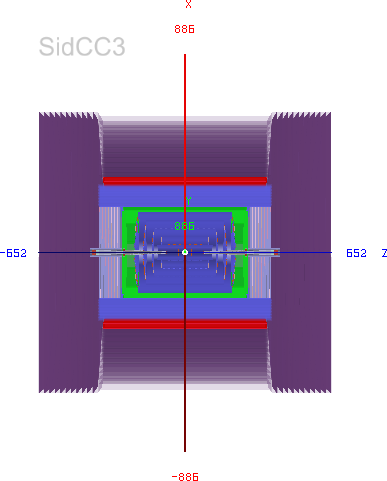Information about the "sidcc3" detector
Summary
| Name: |
sidcc3
|
| Title: |
Silicon Detector for CEPC-Si design studies
|
| Author: |
S.Chekanov, M.Demarteau, W-M.Yao, M.Ruan
|
| Status: |
development
|
| Version: |
$Id: compact.xml,v 1.2 2017/09/14 15:46:56 S.Chekanov Exp $
|
| Level: |
Geant4 simulation and full event reconstruction
|
| Summary: | view |
| 3D View: | |
| GeoManager: | |
| Calibrations: | view |
| Tracking: | view |
| Last modified: |
October 29, 2019
|
Reconstruction tags
Detector geometry files
Download of complete detector
|
 |
Comment
The compact format for the Silicon Detector for 250 GeV Circular Collider. Includes global XY segmentation in cal endcaps. "Silicon Detector (version 2) for 250 GeV Circular Collider (sidcc2). Based on SiD LOI sidloi3. It has a reduced magnetic field for the solenoid (from 5 T to 3 T) and and the calorimeter has 35 layers for HCAL barrel and Endcap, instead of 40 and 45 (endcap) layers as for the original SiD proposal. Minimum number of hits per track is 5 (original had 7 hits). Ecal has 4mm cells (vs 3.5 mm for SiD), and muon section has 4cm cells (vs 3cm for SiD). Other detector parameters are the same as for SiD. This detector is described in S.Chekanov and M. Demarteau, Conceptual Design Studies for a CEPC Detector. arXiv:1604.01994 (April 7, 2016) http://arxiv.org/abs/1604.01994. A white paper contributed to the IAS Program on High Energy Physics (4-29 Jan, 2016). International Journal of Modern Physics A (IJMPA) Volume No.31, (Oct 2016) Issue No. 33, 1644021-1
Unlike sidcc1 and sidcc2 geometries, the current design features 3 T field and 1.8 m outer tracker, and other changes that are required for better tuning to the CEPC CDR (2017) (alternative silicon tracker). In particular, the first inner layer of the tracker starts at R=15mm, to allow for a larger beam pipe (R=14.6mm).
Additional information
The studies based on this concept are described in
this wiki.
Back



 Tag lists:
Tag lists: